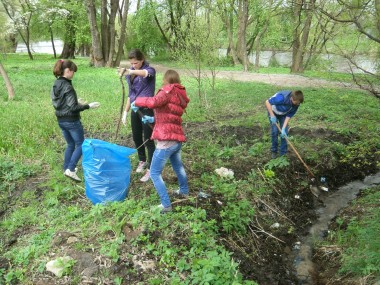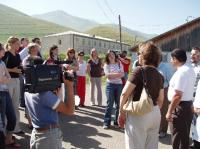As identified in the concept note of the meeting, “…Development practicioners all over the world increasingly realize the importance of decentralisation, good governance and effective local development to achieve commonly held development goals. Gender mainstreaming and the human rights-based approach are two frameworks to guide local development efforts to ensure that they benefit those in need of assistance and contribute to positive cooperation between duty bearers and claim holders”.
In this context, on 13-15th of June, 2006 O.Ursu and I.Skaliy, MGSDP team members, participated in a joint meeting of Communities of Practices on “Applying a Human Rights-Based Approach and Maintreaming Gender in Local Development Programming” organised jointly by BRC and UNDP of Armenia in Yerevan. Major objective of the meeting was to exchange the experience of CoPs experts and practicioners on integrated local development, a human rights-based approach and mainstreaming gender to review the best practices, plan knowledge products in the substantive areas, and help to clarify the direction of UNDP’s regional work in the countries of South East Europe and the CIS in 2006-2010.
For this purpose, UNDP Bratislava Regional Centre (BRC) and Country Office (CO) of Armenia gathered 38 UNDP representatives, including L.Vinton and M.Venancio, Senior Programme Managers from the Headquaters in New-York, D.Gercheva, acting Regional Democratic Governance Team Leader from BRC with the team of experts, R.Metcalfe, Governance and Gender Advisor from RC office of Bangkok, COs of Croatia, Bosnia-Herzegovina, Macedonia, Armenia, Georgia, Moldova, and Ukraine.
In the course of the meeting, the participants went through 5 major session including the following ones:
Introduction to the nexus of local development, human rights based approach and gender mainstreaming;
Presentation of country examples where integrated local development has taken place (UNDP BiH, UNDP Macedonia, UNDP Armenia);
Country/Theme based working group session on the tools to be used for applying human rights and mainstreaming gender;
Field visit to a project site of UNDP Armenia on promoting women’s activities in agriculture;
Presentations of lessons and experiences from the countries on integrated local development (Moldova, Croatia, Georgia, Ukraine);
Report back from working groups and recommendations for tools development.
The presentation of Ukraine was focused on the experience’s of the Municipal Governance and Sustainable Development Programme on applying the human rights through participation of citizens in the decision-making at local level, and on mainstreaming gender. It outlined the tools used for these activites, challenges faced and ways of overcoming them, as well as identified the future iniatives planned on this basis. Electronic slides of this presentation as well as the other materials of this meeting are available on the website http://www.undp.sk/democratic governance.
All participants of the meeting encouraged the UNDP projects and programmes on local development for more serious consideration of the gender and human rights issues in their activities. Clear UNDP policy on this matter and success stories together with the recommendations derived from the meeting will also be posted on the website of the CoP.
In this context, on 13-15th of June, 2006 O.Ursu and I.Skaliy, MGSDP team members, participated in a joint meeting of Communities of Practices on “Applying a Human Rights-Based Approach and Maintreaming Gender in Local Development Programming” organised jointly by BRC and UNDP of Armenia in Yerevan. Major objective of the meeting was to exchange the experience of CoPs experts and practicioners on integrated local development, a human rights-based approach and mainstreaming gender to review the best practices, plan knowledge products in the substantive areas, and help to clarify the direction of UNDP’s regional work in the countries of South East Europe and the CIS in 2006-2010.
For this purpose, UNDP Bratislava Regional Centre (BRC) and Country Office (CO) of Armenia gathered 38 UNDP representatives, including L.Vinton and M.Venancio, Senior Programme Managers from the Headquaters in New-York, D.Gercheva, acting Regional Democratic Governance Team Leader from BRC with the team of experts, R.Metcalfe, Governance and Gender Advisor from RC office of Bangkok, COs of Croatia, Bosnia-Herzegovina, Macedonia, Armenia, Georgia, Moldova, and Ukraine.
In the course of the meeting, the participants went through 5 major session including the following ones:
Introduction to the nexus of local development, human rights based approach and gender mainstreaming;
Presentation of country examples where integrated local development has taken place (UNDP BiH, UNDP Macedonia, UNDP Armenia);
Country/Theme based working group session on the tools to be used for applying human rights and mainstreaming gender;
Field visit to a project site of UNDP Armenia on promoting women’s activities in agriculture;
Presentations of lessons and experiences from the countries on integrated local development (Moldova, Croatia, Georgia, Ukraine);
Report back from working groups and recommendations for tools development.
The presentation of Ukraine was focused on the experience’s of the Municipal Governance and Sustainable Development Programme on applying the human rights through participation of citizens in the decision-making at local level, and on mainstreaming gender. It outlined the tools used for these activites, challenges faced and ways of overcoming them, as well as identified the future iniatives planned on this basis. Electronic slides of this presentation as well as the other materials of this meeting are available on the website http://www.undp.sk/democratic governance.
All participants of the meeting encouraged the UNDP projects and programmes on local development for more serious consideration of the gender and human rights issues in their activities. Clear UNDP policy on this matter and success stories together with the recommendations derived from the meeting will also be posted on the website of the CoP.


















